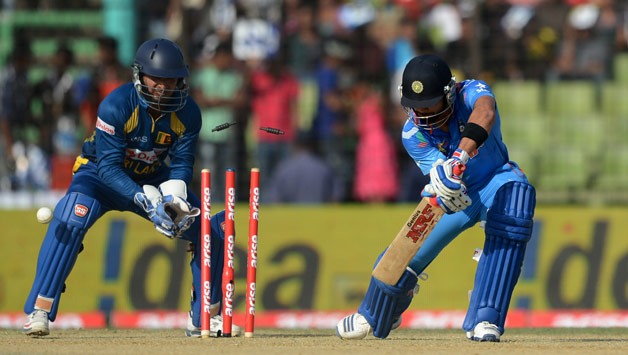
Abhishek Mukherjee
Abhishek Mukherjee is the Chief Editor at CricketCountry. He blogs at ovshake dot blogspot dot com and can be followed on Twitter @ovshake42.
Written by Abhishek Mukherjee
Published: Apr 06, 2014, 11:35 AM (IST)
Edited: Aug 25, 2014, 07:56 AM (IST)


With the ICC World T20 final approaching several sarcastic comments regarding the frequency of India-Sri Lanka matches have been doing rounds on social media. Abhishek Mukherjee tries to find out how frequent India-Sri Lanka matches have been.
Whenever Sri Lanka takes on India in an international contest of any sort, there is a general tone of dismay among (especially among the Indian fans): not an India-Sri Lanka match again! The general notion is that India and Sri Lanka play each other more frequently than any other pair of teams in the world.
[read-also]122496,122567,122574,111742[/read-also]
Of course, this is not true, given the routine the Australians and the Englishmen follow in the oldest surviving contest in international cricket. In the past five years Australia and England have played each other a whopping 63 times; India-Sri Lanka contests come third on the list with 43, next to (this may come as a surprise) the 46 Pakistan-Sri Lanka matches.
However, the comparison is a tad unfair, given the number of matches each side has played: while Australia has played 244 international matches, South Africa has played only 177, so it is only logical that Australia will have more matches per opponent.
A more valid parameter will be to calculate the percentage of matches played against the most prolific opposition with respect to all matches played by that side. In other words, if England has played 226 matches, of which 63 have been against Australia, 63/226 should be the number to look at instead of 63.
Let us check the most prolific oppositions for each team over the past five years. We are leaving out Zimbabwe since a substantial proportion of their matches have been against Bangladesh.
Note: We are using No. 1 opposition, No. 2 opposition, etc to denote the oppositions a side has played most frequently against for the sake of simplicity.
| Team | Matches | No. 1 opposition (1) | Matches vs (1) | % Matches vs (1) |
| England |
226 |
Australia |
63 |
27.88% |
| Australia |
244 |
England |
63 |
25.82% |
| South Africa |
177 |
Pakistan |
36 |
20.34% |
| Sri Lanka |
232 |
Pakistan |
46 |
19.83% |
| Pakistan |
233 |
Sri Lanka |
46 |
19.74% |
| Bangladesh |
139 |
Zimbabwe |
27 |
19.42% |
| India |
228 |
Sri Lanka |
43 |
18.86% |
| West Indies |
197 |
India |
34 |
17.26% |
| New Zealand |
184 |
Sri Lanka |
28 |
15.22% |
As is evident, India are actually seventh on the list. What has led to the notion, then? Is it the number of matches played by India against Sri Lanka compared to the second name (Australia in India’s case) on the list? Let us find that out.
| Team | Matches | No. 1 opposition (1) | Matches vs (1) | No. 2 opposition (2) | Matches vs (2) | (1)/(2) |
| England |
226 |
Australia |
63 |
India |
31 |
2.03 |
| Australia |
244 |
England |
63 |
India |
35 |
1.80 |
| South Africa |
177 |
Pakistan |
36 |
England |
26 |
1.38 |
| Pakistan |
233 |
Sri Lanka |
46 |
South Africa |
36 |
1.28 |
| India |
228 |
Sri Lanka |
43 |
Australia |
35 |
1.23 |
| Bangladesh |
139 |
Zimbabwe |
27 |
West Indies |
22 |
1.23 |
| New Zealand |
184 |
Sri Lanka |
28 |
Pakistan |
24 |
1.17 |
| Sri Lanka |
232 |
Pakistan |
46 |
India |
43 |
1.07 |
| West Indies |
197 |
India |
34 |
Australia |
32 |
1.06 |
Once again, though India ranks fifth on the list (marginally ahead of Bangladesh) there is no reason to believe that they play Sri Lanka more frequently than they play others. It is just another common notion among people who assume more than probe.
(Abhishek Mukherjee is the Deputy Editor and Cricket Historian at CricketCountry. He blogs at http://ovshake.blogspot.in and can be followed on Twitter at http://www.twitter.com/ovshake42)
This website uses cookies so that we can provide you with the best user experience possible. Cookie information is stored in your browser and performs functions such as recognising you when you return to our website and helping our team to understand which sections of the website you find most interesting and useful.
Strictly Necessary Cookie should be enabled at all times so that we can save your preferences for cookie settings.
If you disable this cookie, we will not be able to save your preferences. This means that every time you visit this website you will need to enable or disable cookies again.
